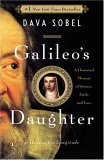Reading Guide Questions

Please be aware that this discussion guide will contain spoilers!
- What impressions or ideas did you have about Galileo before reading Sobels book? Did the book change any of your opinions, and if so, how?
- In what ways did the insertion of the full-length letters of Suor Maria Celeste, and the excerpts from the Rule of Saint Clare and the testimony from Galileo's trial, affect the narrative flow of the story?
- If you have ever carried on an in-depth correspondence with a friend or family member, compare that experience to keeping in touch by telephone or e-mail. Is long-hand letter writing becoming a lost art?<
- How would you characterize Galileo's behavior as a father to each of his children? Was Galileo's relationship with Suor Maria Celeste an ideal father-daughter relationship?
- What part did Galileo's frequent bouts of illness play in his personal and professional decisions?
- Which aspects of convent life at San Matteo were most surprising or disturbing?
- Who are the heroic figures in the story? Was Castelli a hero? Signor Geri? Suor Luisa?
- Which arguments did Galileo employ to reconcile his scientific discoveries with his religious beliefs? How do these compare with the current stance of the relationship between science and religion?
- How do you think Galileo would react to the news that pope John Paul II had called for a reexamination of his affair?
- Given the suggestion in one of Suor Maria Celestes letters that she wrote out the final manuscript for Galileo's Dialogue, how do you imagine the two of them might have worked together? How do you think each of them expected the final product to be received?
- Censorship constituted a routine part of the publication process of the 17th century. What part does it play today?
- For what crimes or infractions was Galileo brought to trial? Did his accusers see him as truly a heretic or merely disobedient?
- Viewed in this age of televised court cases, what did you think of the legal process of Galileo's trial?
- Why did Galileo abjure his belief in the Copernican system? What do you think would have happened to him and his family if he had refused to abjure?
- Can Galileo's arguments in defense of the Copernican model of the universe be applied to recent debates about the teaching of evolution in the classroom?
- Which scientific ideas of Galileo's turned out to be wrong? How could incorrect assumptions lead him in the right direction for establishing modern science?
- Is it possible for us to look at the culture of the 16th century its class system, the options available for women, commonly held views on how diseases are spread without imposing a 21st century perspective?
- Can you see any similarities between the 17th-century reaction to the bubonic plague and modern responses to the AIDS epidemic in terms of popular superstitions, medical treatments or government intervention?
- Galileo believed that the Bible was a book about how to go to heaven not how heaven goes. Do you agree with him?
Unless otherwise stated, this discussion guide is reprinted with the permission of Penguin.
Any page references refer to a USA edition of the book, usually the trade paperback version, and may vary in other editions.






